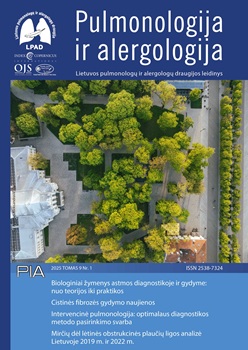NON-SMALL CELL LUNG CANCER TREATMENT WITH THIRD-GENERATION EPIDERMAL GROWTH FACTOR RECEPTOR TYROSINE KINASE INHIBITORS. A SINGLE-CENTER EXPERIENCE
Abstract
Aim of the study. To analyse the effectiveness of third-generation epidermal growth factor receptor (EGFR) tyrosine kinase inhibitor (TKI) treatment in patients with non-small cell lung cancer (NSCLC), and to evaluate circulating cell-free DNA (cfDNA) in plasma for the detection of the EGFR T790M mutation during treatment. Methods. A retrospective prospective analysis of 47 NSCLC patients treated with EGFR TKIs between 2014 and 2025 was conducted. Group I (n = 34) received third-generation EGFR TKIs as first-line treatment; Group II (n = 13) received first- or second-generation EGFR TKIs as firstline treatment and were switched to third-generation EGFR TKIs upon disease progression and confirmation of the T790M mutation. Demographic and clinical data, treatment response, progression-free survival (PFS), overall survival (OS), and cfDNA detection of the T790M mutation in plasma were evaluated in patients receiving first- or second generation EGFR TKIs. Results. Disease progression was observed in 17 (50.0%) Group I patients and 11 (84.6%) Group II patients during second-line treatment with third-generation EGFR TKIs (p < 0.05). Median PFS for Group I was 15.49 months (95% confidence interval [CI]: 11.84–20.18 months), for Group II during first-line treatment – 23.33 months (95% CI: 21.08 – 34.62 months) (p < 0.05), and during second-line treatment – 19.87 months (95% CI: 13.91–35.11 months). Median OS for Group I was 18.47 months (95% CI: 14.94–22.81 months), and for Group II – 48.93 months (95% CI: 37.35–65.39 months), p < 0.01. From 2022 to 2025, among 7 patients treated with first- or second-generation EGFR TKIs, the T790M mutation was not detected in cfDNA plasma analysis, although disease progression occurred. In 2 of these patients (28.6%), the T790M mutation was confirmed in repeat tumor tissue biopsy. Conclusions. NSCLC patients with confirmed EGFR T790M mutation receiving second-line treatment with third-generation EGFR TKIs demonstrated significantly longer OS than those receiving third-generation EGFR TKIs as firstline treatment. Although cfDNA analysis in plasma did not detect the T790M mutation, it was found in 28.6% of repeat tumor biopsies. Therefore, in the case of disease progression and negative cfDNA results, repeat tumor tissue biopsy is recommended.


